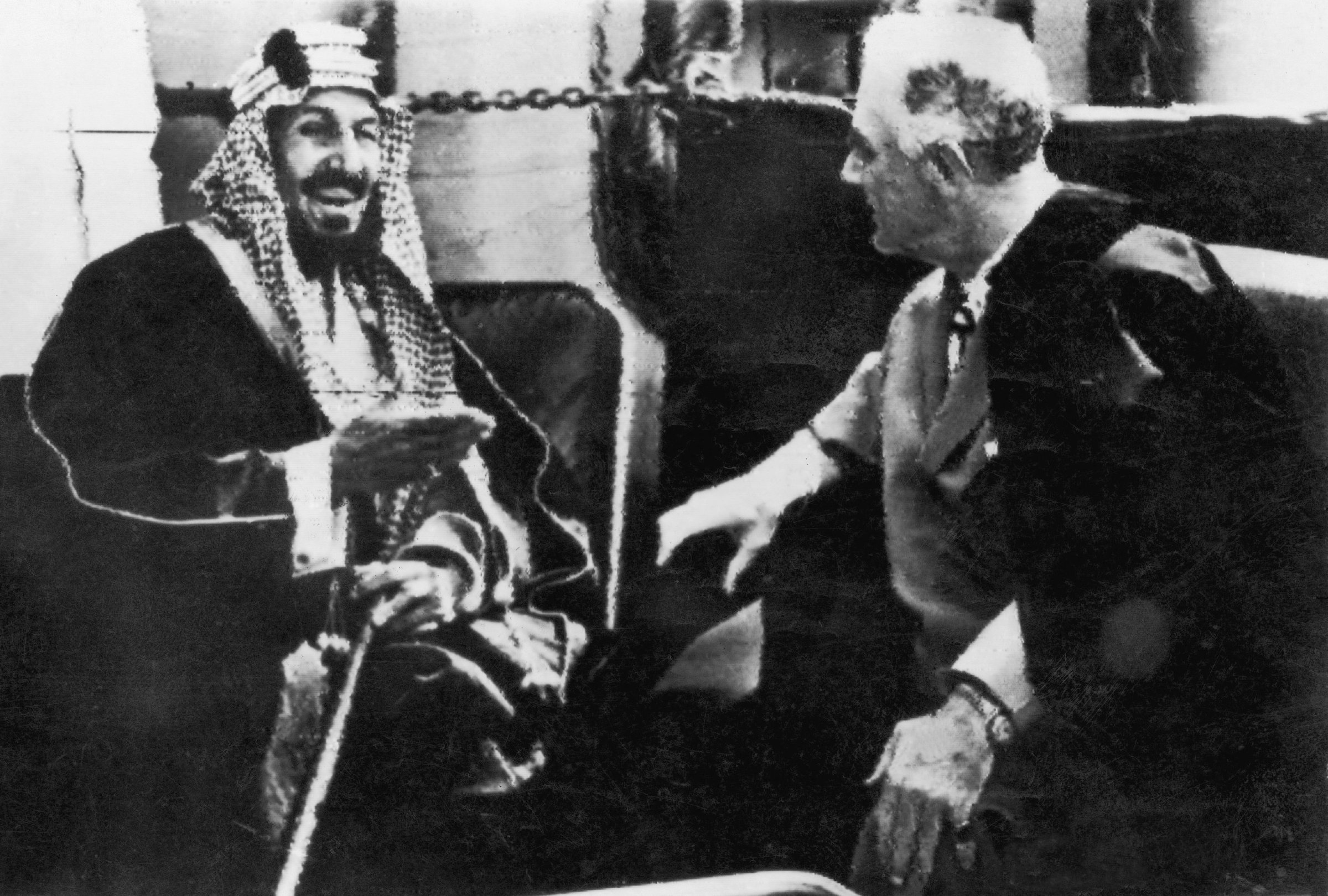
On Sunday, while addressing the Arab Islamic American Summit in Saudi Arabia, President Trump looked ahead to the future relationship between that nation and the United States. He also looked back, however, to the start of that relationship: “Working alongside another beloved leader — American President Franklin Roosevelt — King Abdulaziz began the enduring partnership between our two countries,” he said.
It was Valentine’s Day 1945 when, en route from the Yalta Conference earlier that month, FDR met the man whom TIME described in a Mar 5, 1945, cover story as a “robed, resplendent” King Abdulaziz Ibn Saud, “one of the few living rulers who looks the part,” aboard the USS Quincy cruiser in the Suez Canal.
William Eddy, a Marine Colonel who helped organize the summit, later described how the two connected about not only professional, but also personal matters. Roosevelt gave the King a DC-3 passenger airplane “that even included a rotating throne so the king could always face Mecca when flying,” as well as one of two wheelchairs brought along for the trip after the King said he was having knee problems that made it hard for him to get around, according to a history of the encounter published by the U.S. Army Corps of Engineers. (It’s said that the one concession Roosevelt didn’t make was handing over the cook who made the apple pie to the King, instead letting the ship’s cook train the King’s cook to make it.) It was the King’s first journey outside his realm.
But such gifts were not the most important exchange that day. What really mattered, long-term, was the establishment of U.S. military support for the Saudis and U.S. access to oil.
The meeting was part of a series towards the end of the war, when the world powers were thinking about shifting around the borders of Middle East. The U.S. had its eye on Saudi Arabia, given the nation’s rich oil stores (and an eye on Syria, setting the stage for the tug of war between America and Russia that continues to this day). TIME’s cover story described the stakes:
That [Arab] world is more important because of where it is than because of what it has. A look at the Big Three maps will show that its strategic position is as great now as it ever has been —Teheran lies to the northeast, Yalta to the northwest, Great Bitter Lake in the southwest.
Within it lie the eastern Mediterranean and the Red Sea, parts of Britain’s essential passages to the old treasure house of India and to the new, possibly greater treasure house of Africa. The Arabian Sea (northern part of the Indian Ocean) and the Persian Gulf flank India, reach into some of the world’s richest oil areas, and may yet be Russian outlets to the south — as, until recently, they were Russia’s inlet for Lend-Lease. And adjoining the Arab heartland lie Turkey and Iran — both Moslem but non-Arab —looking out on the Black Sea and the Caspian, which wash at Russia’s outward gates.
The Occident also is concerned with the Arab world because in the Levant (Syria and Lebanon), France clings to shreds of empire, and will not give them up without a struggle which may well endanger world cooperation for the peace.
And millions of people in the Occident cannot forget the Arab world because it includes Palestine. Ibn Saud personifies and constantly bespeaks the Arab case for an all-Arab Palestine. The U.S. and British Governments are committed to a Jewish Palestine — not necessarily all-Jewish, but with too many Jews to suit the Arabs, who, having inhabited it for centuries, regard it as one of their lands.
The results of the Yalta conference may intensify these explosive problems. The Crimea declaration, laying out the areas of Big Three cooperation in Europe, did not deal with the Middle East and its Arab core. The world took due note that Franklin Roosevelt and Winston Churchill, proceeding from Yalta to Egypt, conferred separately with Ibn Saud, King Farouk and Emperor Haile Selassie.
In this explosive area last week a new force was rising, and Ibn Saud was at its crest. That force was Pan-Arabism, an old and often thwarted dream, now coming to real life in Cairo.
On April 5, FDR wrote a follow-up letter to Ibn Saud vowing to keep him in the loop on issues relating to Palestine. A week later, on April 12, Roosevelt died.
Under President Harry S. Truman, the U.S. voted for a U.N. resolution calling for Palestine to be partitioned between Arabs and Jews in late 1947. However, America’s view of Saudi Arabia as a strategic ally — and its view that ensuring safe access to Saudi Arabian oil is a matter of national security — has not changed since that historic first meeting.
More Must-Reads from TIME
- Cybersecurity Experts Are Sounding the Alarm on DOGE
- Meet the 2025 Women of the Year
- The Harsh Truth About Disability Inclusion
- Why Do More Young Adults Have Cancer?
- Colman Domingo Leads With Radical Love
- How to Get Better at Doing Things Alone
- Michelle Zauner Stares Down the Darkness
Write to Olivia B. Waxman at olivia.waxman@time.com